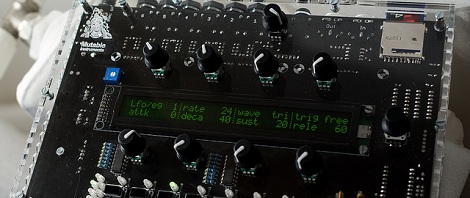
A little bird sent in a tip about a really cool MIDI synth. It’s called the Ambika, and it seems like just the thing to introduce a synth head to the world of soldering.
Compared to an entry-level synthesizer like the microKorg or its ilk, the Ambika is packed full of really cool features that just happen to sound awesome. In addition to the basic saw, square, and sine waves, there is also FM, and wavetable synthesis along with a noise generator, rudimentary voice synth, and a bitcrushed sawtooth wave voice. Really, the sound demos (available after the break) speak for themselves.
The hardware is based on the ATMega644p, a fairly high-powered 8-bit microprocessor notably used in the Sanguino. This synth supports up to 6 voices, each individual voice is contained on a separate circuit board attached to the motherboard.
Of course, the schematics/board files/firmware for the Ambika are freely available along with a pretty amazing set of technical notes. There’s no word on how much the Ambika will cost, but having it available as a kit should make it palatable if you don’t mind spending a Saturday holding an iron.
Tip ‘o the hat to an anon for sending this one in.
[soundcloud url=”http://api.soundcloud.com/playlists/2157531″ height=”200″ iframe=”true” /]















suatmm
Sublime.
Thats an awesome synth.
Hope they or others make a kit for it like the Shruthi-.
I would buy one today! looks like a lot of fun to play around with.
i would love to play around with this synth.
There are tons of these things around.
If anyone wants to get one very similar the same guy makes a synth called Shruthi-1. Other options include PreenFM or the Open Source Hardware Meeblip. I have an old meeblip and is a good cheap DIY synth.
@Poo: There are not tons of these things around. Tons of synths? Yes. Good synths? Fewer. Great synths? Even fewer still. Mutable Instruments products are a different caliber of awesome. If this synth is anywhere near as good as the Shruthi-1 is, then Olivier and Mutable Instruments will knock it out of the ballpark. The best part about all of this is that this guy is just getting started. He hasn’t been creating synths for very long at all. I truly believe he could come to rival names like Bob Moog, Dave Smith, Roger Linn, etc.
Nail on head, the feature set of this thing is an absolute wet dream for most synth nerds. Polyphony out of an instrument with a mostly analog signal chain is a much coveted ‘holy grail’ amongst the synthesizer DIY crowd and somewhere few have gone.
The samples were awesome. My only question is, what is the difference between the software synthesizers for computers vs. the hardware kind like this.
For the synth-curious, not much. For synth nerds, it’s like the difference between mp3s and vinyl, or digital photography vs. film.
All software synths are just code, trying to emulate the response of discreet analog components. Some hardware synths (virtual analog) are specialized computers to run software that sounds like discreet analog components. Some hardware synths ARE discreet analog components. Most people think analog sounds more “alive” and software is too sterile. What’s interesting about Mutable Instruments is the blend of analog/digital.
I’m trying really hard not to sound like a synth snob… lol.
And then there’s Google’s synth. http://www.google.com/doodles/robert-moogs-78th-birthday
It has a bunch of virtual knobs to fiddle with and can record up to 4 tracks to play back.
Combine it with audio capture software and it can do some pretty neat stuff.
I’m not so sure the Microkorg (which is a bit of a toy really) is the best thing to compare the Ambika to. It has more in common with the DSI Poly Evolver or the uber ‘hybrids’ of the 1980s- which the Ambika stacks up very favorably to. That’s also disregarding the fact that the Ambika is a well documented open source device that you can build yourself, you can see why the synthesizer nerds are excited.
I chose the microkorg as an example because it’s more familiar; even if you don’t know who Dave Smith is, if you’ve seen an emo/indie band in the last few years, you’ve seen a microkorg.
It’s a damn shame and makes me want to build a bitcrusher pedal right now.
Just sold a DW8000 this weekend. Prices have fallen drastically in the vintage synth area, with the facebook generation simply torrenting all the VST and repacks they can. Destroyed the price of the real things, but a great time to stock up on the “classics”. I got a Rogue for $70 and an Ensoniq MR61 for $50. Which only sux if you are in the synth repair/modding business like I (was).
My MeeBlip Micro kit arrived today – only took 2 hours to build, despite the encroaching arthritis. Worked first time, no probs!
Sounds *excellent* through the 400W mini-rave rig.